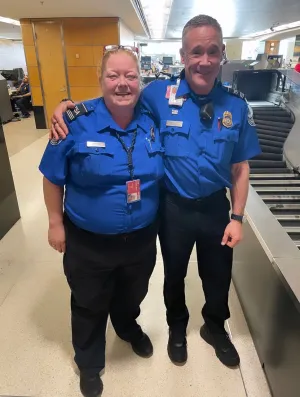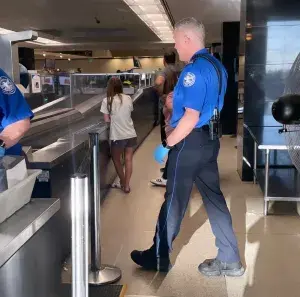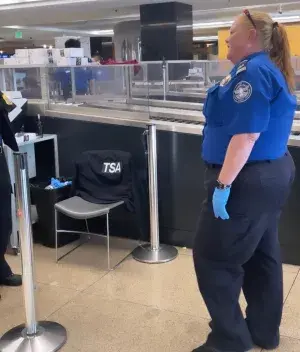 Seattle-Tacoma International Airport (SEA) Supervisory TSA Officers Teri Shoemaker and John Rhoades come to the aid of a passenger who suddenly collapsed near the checkpoint. (Photo courtesy of TSA SEA)
Seattle-Tacoma International Airport (SEA) Supervisory TSA Officers Teri Shoemaker and John Rhoades come to the aid of a passenger who suddenly collapsed near the checkpoint. (Photo courtesy of TSA SEA)
What appeared to be a normal overnight shift for the TSA team at Seattle-Tacoma International Airport (SEA) suddenly turned into crisis mode when a passenger collapsed near one of the checkpoints.
Supervisory TSA Officers John Rhoades and Teri Shoemaker raced into action to help the 61-year-old woman who suffered a seizure.
Rhoades, who was in one of SEA’s food courts at the time, immediately called 911 and tried to keep the passenger calm until medics arrived.
“While I was on the phone (with emergency dispatch), I had her arm, asked her questions and tried to determine what was going on,” Rhoades described. “Then, I saw Teri entering the concourse and waved for her to come over. Teri immediately engaged the passenger, sat on the floor with her and started assuring her that we were going to help her.”
The woman told Rhoades and Shoemaker she was headed home after spending 12 days in intensive care in Las Vegas.
“I repeatedly told her we would not leave her, we were going to help her and medical assistance was on the way,” recalled Rhoades. “She then asked us if she was going to die. My heart jumped, and I became profoundly emotional. I told her in a commanding voice she was not going to die, we were here and she could not leave us.”
Then, the woman stopped breathing and didn’t appear to have a pulse. Shoemaker immediately started administering CPR while Rhoades untangled the passenger’s clothing and the numerous shoulder bags wrapped around her.
“As a caregiver for multiple family members, I have taken some basic CPR classes and classes on dealing with people having seizures,” Shoemaker said. “I have been around several people struggling with seizures, but this was the first time anyone stopped breathing.”
Rhoades recalled how they positioned the passenger on her back, cleared her airway and removed any possible obstructions before the fire department arrived and took over. The two TSA officers remained on the scene to provide medics with any additional assistance needed.
“My TSA breach protocol training was specifically helpful,” Rhoades noted. “I immediately identified needs and delegated efforts to different officers. I radioed for the portable walls to be brought to the back of the checkpoint. Teri sat on the ground with her, allowing me to stay on the phone with 911, contact the TSA Seattle Coordination Center and gave me the time to make a second 911 call when (the passenger) stopped breathing. I was able to remain on point and direct others as necessary.”
Shoemaker described the teamwork as “amazing,” and she felt relief when the woman regained consciousness on the scene. However, she admitted it was a stressful time for all.
“I was able to stay calm during the incident; however, I hyperventilated after the medics took over,” said Shoemaker. “I think it’s very important to stay calm. The person in distress needs you to think clearly.”
Greg Hawko, TSA federal security director (FSD) for the state of Washington, said Rhoades and Shoemaker were amazing, and their actions are indicative of the incredible TSA team in his state.
“They did not take time to think and just acted on their instincts and training,” Hawko emphasized. “Their immediate actions made an enormous difference to the passenger’s chances of survival. I continue to be proud of all our team does in Washington. Incidents like this highlight our amazing workforce to the entire agency, airport stakeholders and the public.”
Hawko said this was the fourth incident at SEA in which TSA officers provided immediate CPR to individuals in the past year.
“We have a workforce of heroes,” he proclaimed.
Rhoades and Shoemaker are receiving a cash award, and Hawko recognized each hero with an FSD coin.
Rhoades said this emergency is a great example for all of us to remain calm, use our network and don’t do anything, such as CPR, in which you don’t have training.
The two officers and Hawko were unable to provide an update on the passenger’s condition.
“While I do not know the final outcome, I care about her, think about her and say a prayer for her every day,” said Rhoades. “Our occupation has us operating in an environment that, over time, may cause us to grow less patient, less tolerant, less understanding, and less caring. Don’t lose your humanity. Help if you can. We all need others, even strangers, to help us along the journey of life.”
Related story: SEA officers save life; seconds mattered, officers acted
By Don Wagner, TSA Strategic Communications & Public Affairs


